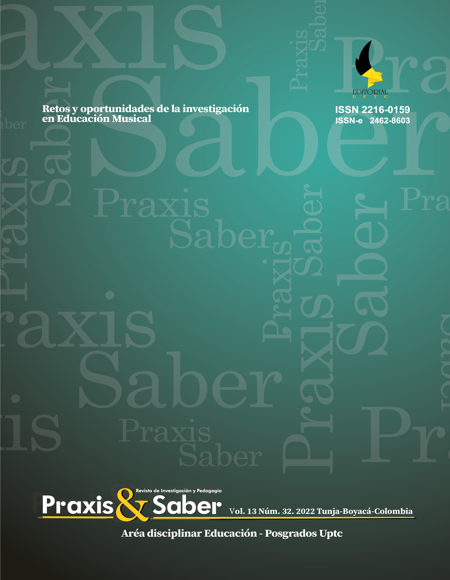Pedagogy of autonomy in music education: contributions from the Freirean reading of the world

Abstract
This essay celebrates the centenary of the birth of Paulo Freire (1921-2021) with a discussion on the relevance of his legacy from the perspective of the pedagogy of autonomy and the reading of the world in music education. The text starts with the concept of epistemological curiosity and its connection with creativity, and intertwines Freirean thoughts and principles with the training of teachers in the field of music education. The contributions of Freire’s work to music education support this text, based on the author’s experiences and pedagogical practices in the implementation of projects related to teacher training and basic and higher education.
.
Keywords
musicality, creativity, teacher training
References
- Abrahams, F. (2005). The application of critical pedagogy to music teaching and learning. DOI: https://doi.org/10.1177/87551233050230020103
- Visions of Research in Music Education, 6. Recuperado de: http://www.rider.edu/~vrme.
- Abrahams, F. (2007). Musicing Paulo Freire: A critical pedagogy for music education. In: Mclaren, P.; Kincheloe, J. L. (Org.). Critical Pedagogy: Where are we now? Counterpoints: studies in the postmodern theory of education. Peter Lang Publishing, 2007, p. 223-237.
- Benedict, C., & Schmidt, P. (2014). Pedagogias críticas e práticas músico-educativas: compartilhando histórias práticas, políticas e conceituais. Revista da Abem, 16(20). Recuperado de http://www.abemeducacaomusical.com.br/revistas/revistaabem/index.php/revistaabem/article/view/244/176
- Bolaños Motta, J. (2016). El docente ante el oficio de investigar en el aula. Praxis & Saber, 7(15), 63-80. https://doi.org/10.19053/22160159.v7.n15.2016.5723 DOI: https://doi.org/10.19053/22160159.v7.n15.2016.5723
- Brasil. Lei nº 12612, de 13/04/2012. Declara o educador Paulo Freire Patrono da Educação Brasileira. Disponível em: http://www.planalto.gov.br/ccivil_03/_Ato2011-2014/2012/Lei/L12612.htm
- Congresso Nacional do Brasil. (2012, 13 de abril). Lei nº 12 612. Declara o educador Paulo Freire Patrono
- da Educação Brasileira. http://www.planalto.gov.br/ccivil_03/_Ato2011-2014/2012/Lei/L12612.htm
- Cuervo, L. (2015) Educação para a paz na formação de professores. In: Cuervo, L. & Porto, D. (Orgs). Escolas da paz: reflexões e práticas de professores da educação básica. UFRGS, 2015.
- Cuervo, L. (2020). Laboratório de Musicalidades: cantarolando. UFRGS
- Cuervo, L. (2021). Educação para a paz em tempos de ódio no Brasil: contribuições epistemológicas
- freireanas [Palestra]. Congreso Pedagogía Cuba 2021: Encuentro Internacional por la Unidad de los
- Educadores. Virtual. https://trabajos.pedagogiacuba.com/trabajos/22Educa%C3%A7%C3%A3o%20
- para%20a%20paz%20em%20tempos%20de%20%C3%B3dio%20no%20Br a s i l .
- pdf?fbclid=IwAR2RIDVCfpL25J86imLh2RBG5c5v4EHxbbvNlGON0WC3hJ_VUVGO5i5zGns
- Cuervo, L., Welch, G., Maffioletti, L., & Reategui, E. (2019). Musicalidade humana sob o prisma
- cognitivo-evolucionista: do Homo sapiens ao Homo digitalis. Revista OPUS, 23(2), 216-242. https://
- doi.org/10.20504/opus2017b2310
- Cuervo, L., & Santiago, P. (2020). Percepções do impacto da pandemia no meio acadêmico da música.
- Revista Música da USP, 20(2), 357-378. https://doi.org/10.11606/rm.v20i2.180068 DOI: https://doi.org/10.11606/rm.v20i2.180068
- Freire, P. (1967). Educação como Prática da Liberdade. Paz e Terra.
- Freire, P. (1970). Pedagogia do oprimido (17ª ed.). Paz e Terra.
- Freire, P. (1981). Ação cultural para a liberdade (5ª ed.). Paz e Terra.
- Freire, P. (1989). A importância do ato de ler: em três artigos que se completam. Cortez.
- Freire, P. (1993). Pedagogía de la esperanza: un encuentro con pedagogía del oprimido. Siglo XXI.
- Freire, P. (1996). Pedagogia da Autonomia: saberes necessários à prática educativa. Paz e Terra.
- Gadotti, M. (2005). A questão da educação formal/não-formal [Palestra]. Seminário Direito à educação:
- solução para todos os problemas ou problema sem solução? Institut International Des Droits De
- L’enfant, Suíça.
- Gainza, V. (1988). Estudos de Psicopedagogia Musical. Summus.
- Green, L. (2008). Music, informal learning and the school: a new classroom pedagogy. Ashgate.
- Levitin, D. (2016). The World in Six Songs: How the Musical Brain Created Human Nature. Penguin
- Books.
- Oroza, E. (2012). Desobediencia tecnológica: de la revolución al revolico. http://www.ernestooroza.com/
- desobediencia-tecnologica-de-la-revolucion-al-revolico
- Paiva, V. (2016). Paulo Freire é terceiro teórico mais citado em trabalhos acadêmicos no mundo. https://
- www.hypeness.com.br/2016/06/paulo-freire-e-terceiro-teorico-mais-citado-em-trabalhosacademicos-
- no-mundo/
- Penna, M. (1995). Ensino de música: para além das fronteiras do conservatório. Em Y. Peregrino
- (Coord.), Da camiseta ao museu: o ensino das artes na democratização da cultura (pp. 129-140).
- Editora Universitária da UFPB.
- Rodrigues, A., & Cuervo, L. (2021). Desafios da docência no ensino remoto emergencial de música:
- reflexões e práticas na cultura digital. In: CONGRESO INTERNACIONAL EN MODALIDAD VIRTUAL PEDAGOGÍA, Ministerio de educación republica de Cuba, Havana, Cuba. https://
- trabajos.pedagogiacuba.com/trabajos/49Desafios%20da%20Doc%C3%AAncia%20no%20
- Ensino%20Remoto%20Emergencial%20de%20M%C3%BAsica.pdf
- Schmidt, P. (2005). Music education as transformative practice: Creating new frameworks for learning
- music through a Freirian perspective. Visions of Research in Music Education, 6, 1-16.
- Slamkowski, T. (2015). Freirean Pedagogy in Music Education [Tese de Mestrado, University of
- New Mexico]. UNM’s Digital Repository. https://digitalrepository.unm.edu/cgi/viewcontent.
- cgi?article=1040&context=mus_etds
- Talbot, B., & Williams, H. (2019). Critically Assessing Forms of Resistance in Music Education. Em D. DOI: https://doi.org/10.1093/oxfordhb/9780190265182.013.17
- Elliott, M. Silverman, & G. McPherson (Eds.), The Oxford Handbook of Philosophical and Qualitative
- Assessment in Music Education (pp. 83-100). Oxford University Press. https://doi.org/10.1093/
- oxfordhb/9780190265182.013.17